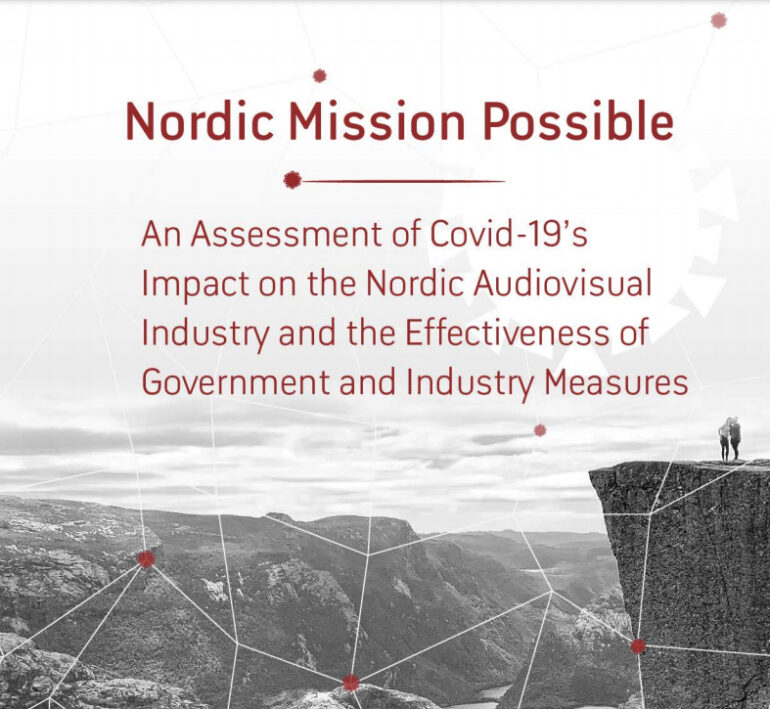
TV dramas and Sweden were the most affected, but only 2% of projects were cancelled, according to the ‘Nordic Mission Possible’ report ordered by the Fund.
“Nordic Mission Possible-An Assessment of Covid-19’s Impact on the Nordic Audiovisual Industry and the Effectiveness of Government and Industry Measures” was commissioned by Nordisk Film & TV Fond to Oslo-based BI Centre for Creative Industries (BI:CCI).
The paper was supervised by project leader Terje Gaustad, with support from researchers Peter Booth, Endre Offerdal, Linnea Svensson, as well as Anne-Britt Gran.
TO DOWNLOAD THE REPORT CLICK HERE.
Besides a concise summary of restrictive measures, mitigating government and industry measures implemented between March and November 2020 in each Nordic territory, the report gives a clear overview of the impact of the pandemic on the Nordic production sector, thanks to a project-led - rather than company-led analysis.
Through an evaluation of 155 feature film, theatrical documentary and TV drama projects, a mix of case studies and qualitative surveys, the team of researchers identified some key findings.
- Drama series were hit hardest by the restrictive measures but also gained the least from the mitigating measures, compared to feature films and documentaries. “This reflects the nature of drama series, less dependent on subsidies, and which therefore benefitted only marginally from the Covid-specific support packages,’ said Terje Gaustad.
- The higher the budgets the more projects were vulnerable to the restrictive measures and mitigating measures were less effective.
- Projects in pre-production as of March 12, were impacted the most (57% of projects), followed by projects not yet greenlit or just greenlit (50%) and projects in post-production or pre-release stage (8%).
- The restrictive measures created new challenges to producers as shooting days increased by 7%, shooting periods were extended by 21%, partly resulting in the 10% average increase in production costs. Meanwhile production revenues were cut by an estimated 17%, which had a double negative effect on the financial viability of the projects.
- Sweden which relied on recommendations rather than strict restrictive measures during the first wave of the pandemic, was surprisingly the most affected among the Nordic territories. For Gaustad, this was partly due to the high number of big budget Swedish TV series, that were in pre-production or production when Covid-19 first hit. “The Swedish case also reflects the transnational nature of the industry, with co-productions, foreign crews in the case of major international projects, that tend to limit the impact of mitigating measures from national governments or funds. That was particularly interesting,” Gaustad noted.
- Iceland stood out as the country where mitigating measures had the most positive effect (50% of projects reported high impact of those measures), in sharp contrast with Finland at the lowest end (15%).
- Regarding climate footprint, the report stated that cuts in air travel due to the pandemic had a clear impact, although the industry still lacks in terms of efficient toolkit to measure carbon emissions. “Looking ahead, at a time when cost-efficiency is quintessential for the production sector, it is all the more essential for the industry to look into proper toolkits to accurately track and offset their carbon emissions, and to then integrate those elements early in their production budget, to then make informed decisions,” added Gaustad.
Commenting on the overall findings of the report, the Project Leader stressed the remarkable resilience of the Nordic audiovisual industry. “It is rather amazing that only 2% of the 155 projects were cancelled due to the pandemic! I see this as a very positive sign for the industry, as people were able to adjust and keep their projects alive under very difficult circumstances.“
Liselott Forsman, CEO at Nordisk Film & TV Fond said:
“We are very proud to launch BI:s research together with Terje and the rest of his excellent and dedicated team. The combination of quantitative and case study research draws a clear and nuanced picture, which helps us understand these exceptional times today and in the future.
Analysing Covid-19 industry effects and evaluating mitigations is useful information for upcoming discussions on sector-specific mitigations, even more so as the results are combined with producers’ thoughts on issues such as the future of international co-productions. Our pan-Nordic mitigation studies will continue in 2021, and so will surely the emission calculations. Sustainability is something we Nordics next need to look into strongly together," Forsman said.
“Nordic Mission Possible” was put together with the help of the film institutes and producers’ associations in Denmark, Finland, Iceland, Norway and Sweden.
Due to the evolving situation of Covid-19 and its impact on the industry, Nordisk Film & TV Fond has asked B.I:CCI’s Endre Offerdal from the research team, to continue the study in a separate survey to be published at a later date.
